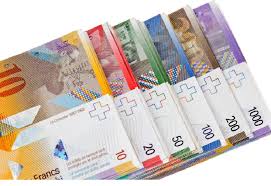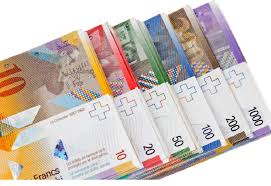
The Swiss National Bank hasn’t stopped capping its currency even though it may have abandoned its currency cap.
According to Bank of America Corp. and the wealth-management unit of UBS Group AG, policy makers defending a de facto franc limit more than 10 percent stronger than the one they scrapped 21 months ago even while they haven’t confirmed it. The franc snapped back each time it appreciated to this 1.08-per-euro threshold on four occasions.
However there is a cost to the SNB by preventing a stronger franc, which could hurt the economy. Leaving the central bank vulnerable to swings in currency markets as it manages a growing pot of money, intervening to buy euros has helped push its foreign reserves to a record of about $630 billion.
The SNB dropped the official cap in January 2015, when its reserves stood at $498 billion and one of the reasons SNB President Thomas Jordan gave for this was preventing an “uncontrollable expansion” of its balance sheet.
“There’s continuous political pressure on the SNB that it’s using so much money for stabilizing the currency. With this intervention, they have quite a lot of euro assets, and of course if there’s an appreciation of the franc, these euro assets will lose in terms of value,” said David Kohl, the Frankfurt-based head of foreign-exchange research at Julius Baer Group Ltd., ranked by Bloomberg as the most-accurate currency forecaster.
Compared to the euro during the past six months, the franc has been helped to become one of the least-volatile major currencies due to the unofficial cap. The only smaller price swings have been experienced by the pegged Danish krone. On the issue of the existence on a de facto exchange-rate cap there were no comments from SNB spokesman Walter Meier.
“There’s no suggestion from the SNB themselves that they’ve set a floor. But we look at the price action, we look at the charts, and we say that 1.08 has been a level which the Swiss franc hasn’t been able to strengthen beyond,” said Kamal Sharma, director of Group-of-10 currency strategy at Bank of America in London.
Prompting the SNB to openly step into curb its advance was the rallying in the wake of Britain’s June 23 vote to leave the European Union.
Sparking turmoil across global markets, in Jan. 2015, the SNB’s shock decision to end its currency cap sent the franc surging more than 40 percent in matter of minutes and the newfound calm marks a turnaround from the aftermath of Jan. 15.
According to Thomas Flury, the global head of currency strategy at UBS Wealth Management, there’s a danger this volatility could return if defending the “soft floor” in the euro-franc rate becomes unsustainable.
Zurich-based Flury said that because the SNB could shift it at any time to account for moves in the euro, “I personally don’t trust the 1.08 floor”. He added that “as we’ve seen when the floor was broken in January 2015, if you have the floor for too long a time, the impact of breaking” it can be “quite harsh,” not only for the franc, but other currencies, too.
(Source:www.bloomberg.com)
According to Bank of America Corp. and the wealth-management unit of UBS Group AG, policy makers defending a de facto franc limit more than 10 percent stronger than the one they scrapped 21 months ago even while they haven’t confirmed it. The franc snapped back each time it appreciated to this 1.08-per-euro threshold on four occasions.
However there is a cost to the SNB by preventing a stronger franc, which could hurt the economy. Leaving the central bank vulnerable to swings in currency markets as it manages a growing pot of money, intervening to buy euros has helped push its foreign reserves to a record of about $630 billion.
The SNB dropped the official cap in January 2015, when its reserves stood at $498 billion and one of the reasons SNB President Thomas Jordan gave for this was preventing an “uncontrollable expansion” of its balance sheet.
“There’s continuous political pressure on the SNB that it’s using so much money for stabilizing the currency. With this intervention, they have quite a lot of euro assets, and of course if there’s an appreciation of the franc, these euro assets will lose in terms of value,” said David Kohl, the Frankfurt-based head of foreign-exchange research at Julius Baer Group Ltd., ranked by Bloomberg as the most-accurate currency forecaster.
Compared to the euro during the past six months, the franc has been helped to become one of the least-volatile major currencies due to the unofficial cap. The only smaller price swings have been experienced by the pegged Danish krone. On the issue of the existence on a de facto exchange-rate cap there were no comments from SNB spokesman Walter Meier.
“There’s no suggestion from the SNB themselves that they’ve set a floor. But we look at the price action, we look at the charts, and we say that 1.08 has been a level which the Swiss franc hasn’t been able to strengthen beyond,” said Kamal Sharma, director of Group-of-10 currency strategy at Bank of America in London.
Prompting the SNB to openly step into curb its advance was the rallying in the wake of Britain’s June 23 vote to leave the European Union.
Sparking turmoil across global markets, in Jan. 2015, the SNB’s shock decision to end its currency cap sent the franc surging more than 40 percent in matter of minutes and the newfound calm marks a turnaround from the aftermath of Jan. 15.
According to Thomas Flury, the global head of currency strategy at UBS Wealth Management, there’s a danger this volatility could return if defending the “soft floor” in the euro-franc rate becomes unsustainable.
Zurich-based Flury said that because the SNB could shift it at any time to account for moves in the euro, “I personally don’t trust the 1.08 floor”. He added that “as we’ve seen when the floor was broken in January 2015, if you have the floor for too long a time, the impact of breaking” it can be “quite harsh,” not only for the franc, but other currencies, too.
(Source:www.bloomberg.com)














